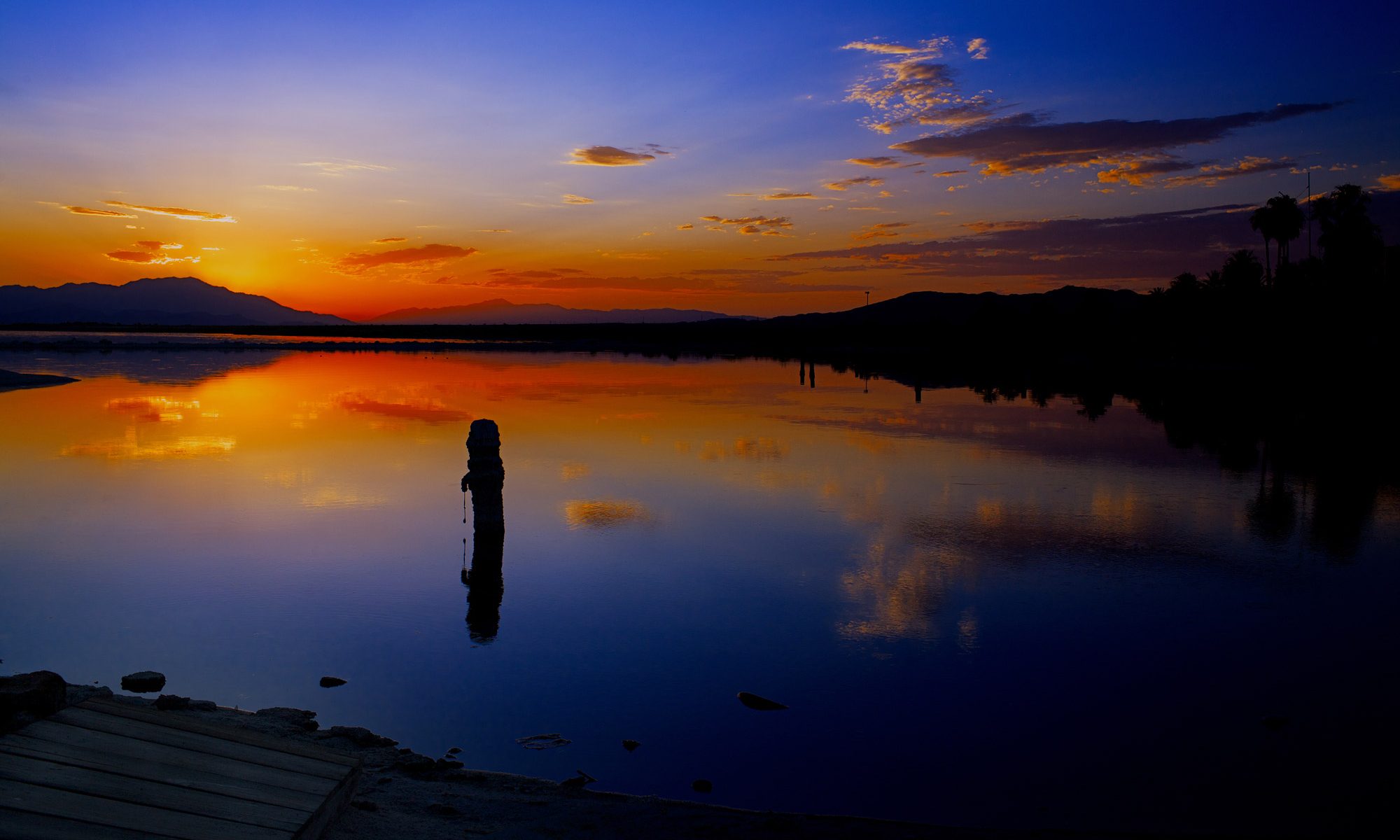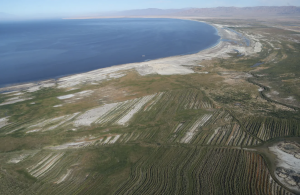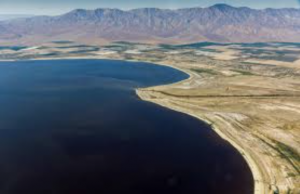
https://www.facebook.com/SaltonSeaRestorationandRenewablesInitiative/videos/1211490482301070

Let's Talk about the Salton Sea!

https://www.facebook.com/SaltonSeaRestorationandRenewablesInitiative/videos/1211490482301070


Saltonseawatch.com has scheduled their partner Spectrumad.com to circumnavigate the Salton Sea once again to monitor the progress or lack of progress being made to mitigate the toxic dust that is being exspelled as the Salton Sea receeds.
Countless concerned citizens post their perspective of what is happening at the sea. The more people that become aware, the better. My philosophy in business has always been “the more ideas the better”! Please submit yours.
This the best description for what is happening at the sea. This video was produced in 2015 and has much information. The 15 year timeline of the qualification settlement agreement ended. The salinity content of the sea when this was produced was 6% it is now over 25%.
Please read https://www.niehs.nih.gov/research/supported/translational/rta/cfg/usc/index.cfm
Imperial County Air Pollution Control District – Notices of Violation Issued at the Salton Sea’s Red Hill Bay to Protect Public Health
IMPERIAL COUNTY — Imperial County Air Pollution Control District (ICAPCD) Tuesday, June 23, issued Notices of Violation (NOVs) to the United States Fish and Wildlife Service (US FWS) for failure to implement adequate dust control on the Salton Sea playa on the Red Hill Bay Project near Calipatria, California, and the landowner, Imperial Irrigation District (IID). ICAPCD issued the violation notices to protect the public’s health and safety. Air pollution violations can result in substantial financial penalties, according to a county press release.
Located near the Southeast corner of the Salton Sea, Red Hill Bay is the site of a habitat restoration project (RHB Project) aimed at creating hundreds of acres of shallow marine wetlands and reducing airborne dust from exposed playa caused by a receding Salton Sea, the release said. The RHB Project is a joint effort between the landowner, IID, and the operator, US FWS. Since 2016, construction of the habitat restoration project has been sporadic, causing numerous instances of elevated levels of airborne dust. As of June 2020, the site is still producing multiple events of excessive airborne dust violating ICAPCD rules, threatening public health and safety.
According to the California Air Resources Control Board (CARB), small airborne dust particles deposit on the surfaces of the larger airways of the upper region of the lung. Particles deposited on the lung surface can induce tissue damage, and lung inflammation. Exposure to small dust particles are associated with worsening of respiratory diseases, including asthma and chronic obstructive pulmonary disease (COPD), leading to hospitalization and emergency department visits. Older adults with chronic heart or lung disease, children, and asthmatics are more likely to experience adverse health effects. Also, children and infants are susceptible to harm from inhaling fine dust particles because they inhale more air per pound of body weight than do adults — they breathe faster, spend more time outdoors and have smaller body sizes. In addition, children’s immature immune systems may cause them to be more susceptible to particulate matter than healthy adults.
The Imperial Irrigation District responded with a press release regarding the violations alleged by the air pollution control district. The report said IID will collaborate with the State of California and federal governmental agencies to assist in implementing dust mitigation projects at the Salton Sea, including Red Hill Bay.
While the legal action taken by Imperial County must be considered by the IID Board of Directors, Imperial Irrigation District understands the County’s sincere interest in seeing that issues at the Salton Sea get the attention they deserve. IID, too, is similarly sincere in its efforts at the Sea and is also frustrated by the lack of progress. IID said they, along with their partners up and down the state, are very concerned for the protection of human health and the environment, and while they all have come a long way — cooperating on issues over time — IID agreed that all parties must follow through in their commitments so that real progress can be made.
Source: The Desert Review (LINK)
For Immediate Release
June 23, 2020
IMPERIAL COUNTY – Today, Imperial County Air Pollution Control District (ICAPCD) issued Notices of Violation (NOVs) to the United States Fish and Wildlife Service (US FWS) for failure to implement adequate dust control on the Salton Sea playa on the Red Hill Bay Project near Calipatria, California, and the landowner, Imperial Irrigation District (IID). ICAPCD issued these violation notices to protect the public’s health and safety. Air pollution violations can result in substantial financial penalties.
US FWS and IID have failed to maintain adequate dust controls, which violates ICAPCD Rules 401, 801, and 804 that establish performance requirements for construction/earthmoving activities and open areas. An additional violation was issued to US FWS for failure to comply with the conformity provisions of the Federal Clean Air Act and ICAPCD Rule 925. ICAPCD is committed to working with IID and US FWS to bring them into compliance as soon as possible.
Located near the Southeast corner of the Salton Sea, Red Hill Bay is the site of a habitat restoration project (“RHB Project”) aimed at creating hundreds of acres of shallow marine wetlands and reducing airborne dust from exposed playa caused by a receding Salton Sea. The RHB Project is a joint effort between the landowner, IID and the operator, US FWS. Since 2016, construction of the habitat restoration project has been sporadic, causing numerous instances of elevated levels of airborne dust. As of June 2020, the site is still producing multiple events of excessive airborne dust violating ICAPCD rules, threatening public health and safety.
According to the California Air Resources Control Board (CARB), small airborne dust particles deposit on the surfaces of the larger airways of the upper region of the lung. Particles deposited on the lung surface can induce tissue damage, and lung inflammation. Exposure to small dust particles are associated with worsening of respiratory diseases, including asthma and chronic obstructive pulmonary disease (COPD), leading to hospitalization and emergency department visits. Older adults with chronic heart or lung disease, children and asthmatics are more likely to experience adverse health effects. Also, children and infants are susceptible to harm from inhaling fine dust particles because they inhale more air per pound of body weight than do adults – they breathe faster, spend more time outdoors and have smaller body sizes. In addition, children’s immature immune systems may cause them to be more susceptible to particulate matter than healthy adults.
For several years, ICAPCD has been collaborating with various stakeholders, notably IID, on addressing air pollution caused by the receding Salton Sea shoreline. Although progress has been made in assessing ways to reduce airborne dust from the playa and developing projects that reduce dust, real progress on protecting public health will only occur if those responsible for controlling airborne dust on the playa follow through on their commitments and adhere to the requirements of ICAPCD’s rules. With the issuance of these NOVs, ICAPCD is taking the necessary steps to protect human health and the environment.
If you have any questions, please contact APCD staff Reyes Romero or Katie Burnworth at (442) 265-1800.

Little by little the Salton sea water is drying up. The dust that is exposed is full of contaminated chemical particles and water that the winds transport into the Imperial Valley and Mexicali. We must be diligent and pay special attention to this problem because the blowing particles can cause a dangerous health problem for people in our area